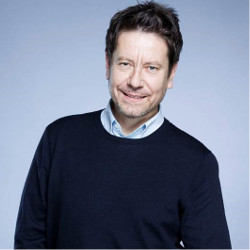My First Play… Alexi Kaye Campbell

© Johan Persson
The first professional job I was offered as an actor was playing a range of characters in an adaptation of Barry Hines’ A Kestrel for a Knave. It was a production that was to tour schools around France, and, after a year of waiting on tables in London and struggling to get an agent, the prospect of travelling around France and performing a wonderful story excited me hugely. As I packed my bags for Paris I imagined eight months of cafés au lait and croissants, conversations about Racine and Molière with drama students and an endless supply of Gauloises. And, inexplicably, a beige raincoat.
The reality of course was a lot less romantic and a little less clichéd. What I remember from that job was the white van which me and the rest of the company seemed to spend hours and hours loading and unloading or travelling in. There were 5 a.m. starts, screws to be screwed, sound equipment to be packed, costumes to be hung up, motorways to be hurtled along, hordes of loud teenagers to be entertained. Some days we were working for fourteen hours, travelling hundreds of miles and performing three shows before returning to our Parisian base after midnight.
We were an eclectic troupe – British, Greek, Croatian, Norwegian, gay, straight and in-between – and inevitably someone was always playing the guitar. I remember once being pulled over by the police as we hysterically waved our arms around the inside of the van trying to rid it of the aroma of recently smoked marijuana. I also remember a terrible argument somewhere south of Nantes (I think it was about upstaging), and a very sudden peasouper an hour outside Lyon when I thought we would all die in a fireball.
But the thing I remember most was tied up with the very reason I was there – to do what I had always wanted to do with my life, which was to tell stories. And we tried to tell this particular story about hardship, commitment and a big bird with as much passion as we could muster. As we brought our many characters to life – I myself was playing a bullying brother, a delinquent schoolchild, a petty bureaucrat and a sadistic headmaster – we worked hard and wholeheartedly, and it was in that work that I came to learn a lesson about performing stories which would hold me in good stead twenty years later when I turned my hand to playwriting.
And the lesson is this: you cannot fake it. Facing a sea of excitable fifteen-year-olds who were watching a play in a language that wasn’t their own, we could not afford to give anything less than everything we had. On the few occasions when for whatever reason we did so – either because of tiredness, bad tempers or laziness – we were quick to know. Suddenly that sea turned against us – it became restless, disrespectful, even mocking – and we were told in no uncertain terms that the failure was ours. Probably the worst thing about those few bad performances was that we had forever planted in certain of those young people’s minds the thought that theatre was not essential.
Because on the days when we gave everything that is exactly what theatre felt like – essential. A contract between two groups of people – one which was telling a story and the other which was receiving it. That contract demanded an extraordinary generosity on both sides. They were giving us their time, their eyes and their ears, and we were going to give them something which could amuse and intrigue them but also – we hoped – could reflect, elucidate, inspire and move. And when that contract was honoured on both sides and together we walked that knife’s edge between this world and another, the result was always magical and always intoxicating.
After those particularly successful performances, the atmosphere in our little white van as we sped back to Paris was always lighter, happier. There was usually some laughter about a prop that had misbehaved or an entrance that was nearly missed, and then the guitar would emerge again and a few strings played. I usually sat in the seat nearest the back with my head against the window pane watching France pass by in the dark. And mostly on those nights I’d be thinking that the choice I had made to follow this path of storytelling was the only one I’d ever want.

My First Play is published by Nick Hern Books. For a 25% discount and free UK p&p (total price £7.49), enter the code WOS FIRST at checkout when buying at nickhernbooks.co.uk/my-first-play










